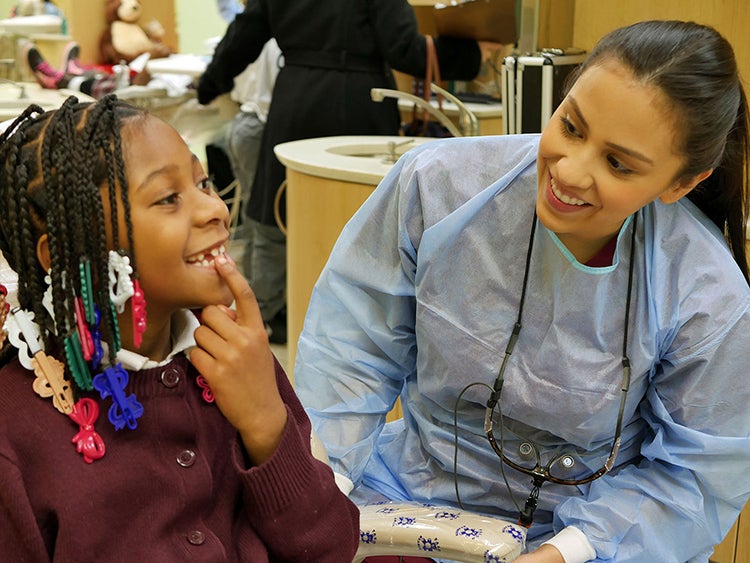Fry Foundation Provides Grant to UIC College of Dentistry for Needs Assessment, Social Work Component

Introduction
The Fry Foundation has provided a $75,000 grant to the University of Illinois at Chicago College of Dentistry’s Department of Pediatric Dentistry for a dual purpose. One is for the department to perform a community needs assessment, to determine families’ requirements, wants, and barriers concerning pediatric dental care. The other is to start a social work program known as “pCARES” (pediatric Counseling Advocacy Referral Education and Service) to support health equity and patients seen in the pediatric dentistry clinics.
“The model was developed at the University at Buffalo School of Dental Medicine,” explained Dr. Marcio da Fonseca, head, Pediatric Dentistry. “They have been very successful with it, and we are adapting it.”
The grant’s Principal Investigators (PIs) are da Fonseca and Dean Clark Stanford.
“Through a needs assessment, we will be better able to understand who the people are who come to see us, what their needs are in terms of dental care for children, and what barriers they have encountered in trying to find dental care in Illinois and in coming to us,” da Fonseca said. “We want to understand all that so we can serve them better.”
The department will perform the needs assessment survey in conjunction with the UIC Survey Research Laboratory at the college of Urban Planning and Public Affairs.
A social worker will be hired “to help increase access to care for these families and to help them with any leads the social worker may have so there is no interruption of care, facilitating all the processes and helping these families go through the system,” da Fonseca said. “For example, we have a lot of immigrant families who may not understand how Medicaid works, so the social worker will help them apply for Medicaid and help them keep their insurance up to date.”
The social worker will interview families to see what needs they have, and “faculty, residents, and dental students will be able to refer patients to them when they have needs with which the social worker can help,” da Fonseca said.
UIC’s Jane Addams College of Social Work also will provide master’s level students doing field placement to work with the department’s social worker. “We are the largest provider of pediatric dental care in the State, so they will be very busy,” da Fonseca said. “They will help the families connect to the services they need in order to get them here.”
And not only for oral healthcare, da Fonseca said, noting, “We want them to help families obtain medical care for children. That will be essential because we have a lot of families here who don’t have a medical home. We want to make sure the children receive holistic care.”
The master’s level social work students will assist the lead social worker in interviewing and assessing families and connecting them with services they need.
“It’s very unusual to have a social worker in dentistry,” Dr. da Fonseca said. “So we’re very excited; there is an enormous need for social workers here in the college. The populations that look for care in dental schools are often low-income, so they have a lot of barriers to accessing care. Social workers will be of tremendous help to them.”
While da Fonseca and Stanford want the patients to benefit from the program, “we also want the dental students, the residents, and the faculty to learn how to work with a social worker,” Dr. da Fonseca said. “I think it will be very important for them to learn how the process works, and how important social work can be in a dental practice.”
“We are pleased to be working in partnership with the College of Dentistry to provide services that enhance the health and well-being of children and their families,” said Dean Creasie Finney Hairston of the Jane Addams College of Social Work. “Collaborative models of health care and service delivery show much promise for addressing both individual needs and and longstanding system issues. Students from social work, dentistry, and other health professions will also benefit from this model of interprofessional training.”
The grant is for a one-year pilot program. da Fonseca and Stanford plan on assessing the outcomes after that year. If the outcomes are good, they plan on applying for additional funding.
Da Fonseca noted that Stanford plans on using pCARES as a pilot program, “to see how well we can integrate more social workers into the College of Dentistry to help our adult patient population as well. This is going to be very important for the college.”